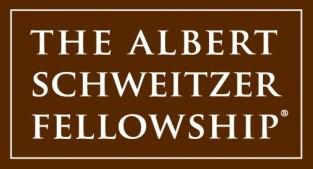
The North Carolina Albert Schweitzer Fellowship (NCASF) announced the selection of its 2019-20 class of Schweitzer Fellows. Twenty-eight graduate students will spend the next year learning to effectively address the social factors that impact health, and developing lifelong leadership skills. In doing so, they will follow the example set by famed physician-humanitarian Albert Schweitzer, for whom their Fellowship is named.

Sachiko Oshima and Thomas Bunning
Site: Duke Outpatient Clinic
Oshima and Bunning are leading teams of medical and social work students who partner with underserved patients at the Duke Outpatient Clinic to achieve personal health goals and improve access to healthcare resources. This is an expansion of a 2017 Schweitzer project.

Elisabeth Seyferth and Spencer Chang (Primary Care Leadership Track)
Site: Freemont Clinic
Seyferth and Chang are partnering with patients of a rural clinic to achieve their health goals with a focus on chronic disease management. They are also targeting challenges with consistency and continuity of care, improving medical student readiness for clinic, and expanding patient resources.
“This is a passionate and dedicated group of students who are seeking to improve health care and access to care,” said Barbara Heffner, Director of the NC Albert Schweitzer Fellowship. “Now more than ever, it is essential that we focus on developing a multidisciplinary pipeline of health professionals who have the dedication, skills, and cultural humility to effectively meet the health needs of these and other underserved people.”
Schweitzer Fellows develop and implement service projects that address the root causes of health disparities in under-resourced communities, while also fulfilling their academic responsibilities. Each project is implemented in collaboration with a community-based health and/or social service organization. The NC Schweitzer Fellowship’s new class of Fellows will led a multitude of service initiatives including sexual assault prevention, support services for women giving birth, connect vulnerable populations to community resources, help patients achieve personalized health goals, provide free dentures and root canals, and much more.
Schweitzer Fellowships have an intensive leadership component so Fellows can inspire others to improve the health of those who experience barriers to care. Fellows work under the close guidance of community and academic mentors during their fellowship year.
“Many of our Fellows go on to inspiring careers of service to vulnerable individuals and populations. Our support for them as they learn how to translate their Fellowship projects from an initial concept to actual, enduring impact is crucial to their future effectiveness in working with the underserved,” said Lachlan Forrow, MD, Chair of The Albert Schweitzer Fellowship Board of Directors. “The rapidly-growing network of our alumni – now thousands of “Schweitzer Fellows for Life” working across the country and the world – is already contributing to major improvements in the care of countless people.”
The 28 NC Fellows will join approximately 250 other 2019-20 Schweitzer Fellows working at program sites around the United States, as well as one in Lambaréné, Gabon at the site of The Albert Schweitzer Hospital, founded by Dr. Schweitzer in 1913. Upon completion of their Fellowship year, the 2019-20 NC Schweitzer Fellows will become Schweitzer Fellows for Life and join a vibrant network of more than 3,600 Schweitzer alumni who are skilled in, and committed to, addressing the health needs of underserved people throughout their careers.
The NC Schweitzer Fellowship is funded through the generosity of Blue Cross Blue Shield of North Carolina Foundation, Duke University School of Medicine, ECU Brody School of Medicine, NCCU School of Graduate Studies, Pitt County Memorial Hospital University Health Systems of Eastern NC, UNC School of Medicine, Wake Forest University Health Sciences and individual donors. Other US-based ASF programs are located in Alabama, Chicago, Columbus-Athens, Oh.; Dallas-Fort Worth; Detroit; Houston; Los Angeles; New Hampshire/Vermont; New Orleans; Pittsburgh; San Francisco and Tulsa.